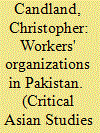|
|
|
Sort Order |
|
|
|
Items / Page
|
|
|
|
|
|
|
| Srl | Item |
| 1 |
ID:
077171


|
|
|
|
|
| Publication |
2007.
|
| Summary/Abstract |
This essay engages the colonial legacy of postwar Japan by arguing that the political cartoons produced as part of the postwar Japanese labor movement's critique of U.S. cultural hegemony illustrate how gendered discourses underpinned, and sometimes undermined, the ideologies formally represented by visual artists and the organizations that funded them. A significant component of organized labor's propaganda rested on a corpus of visual media that depicted women as icons of Japanese national culture. Japan's most militant labor unions were propagating anti-imperialist discourses that invoked an engendered/endangered nation that accentuated the importance of union roles for men by subordinating, then eliminating, union roles for women
|
|
|
|
|
|
|
|
|
|
|
|
|
|
|
|
| 2 |
ID:
077175


|
|
|
|
|
| Publication |
2007.
|
| Summary/Abstract |
With the introduction of capitalist labor relations into China certain attitudes, competencies, and values associated with global capitalism seem to be increasingly valorized. This article analyzes the values and principles ascribed to migrant workers as part of practices linked to modes of government. The author confronts the dominant form of cultural construction of migrant workers through the Shenzhen official press with migrant workers' own narratives about their experience of work (dagong) in the city as the narratives are mediated through two different sites, namely, participant observation, interviews with rural migrants, and a body of unpublished letters to the editor acquired from several magazines dedicated to migrant workers. The article sheds light on the ways in which migrant workers' narratives confirm or, on the contrary, contest the pivotal elements of the hegemonic construction. Three different narratives that migrant workers produce about their own lives and about Shenzhen are examined. These narratives range from affirmations of dominant discourses about migrant workers and expressions of disillusionment about such discourses, to strategic uses of dominant discourses to justify the claims made by migrant workers.
|
|
|
|
|
|
|
|
|
|
|
|
|
|
|
|
| 3 |
ID:
077173


|
|
|
| 4 |
ID:
077174


|
|
|
|
|
| Publication |
2007.
|
| Summary/Abstract |
This article addresses how the state, the market, and intellectual discourse in China construct the sexually promiscuous, dangerous, and threatening rural migrant woman as second-class citizen in opposition to the civilized, demure, and moral city woman who is pictured as a first-class citizen. Rural migrant women's bodies are thus the battleground for the formation of the hegemonic cultural norms. The author describes the ways in which rural migrant hostesses imbue me-dia-constructed stigmatized sexuality with new meanings. Foregrounding hostesses' interactions with clients in the karaoke bar sex industry, the author argues that hostesses perform represented images to redistribute clients' resources and procure legitimate cultural and political first-class citizenship. Their political struggle both challenges and contests media constructions about themselves
|
|
|
|
|
|
|
|
|
|
|
|
|
|
|
|
| 5 |
ID:
077176


|
|
|
|
|
| Publication |
2007.
|
| Summary/Abstract |
This article examines media publicity surrounding the case of Li Ning-a 34-year-old native of Nanjing City, Jiangsu Province, who made legal history in the People's Republic of China (PRC) on 17 October 2004 when he was sentenced to eight years jail and fined 60,000 yuan for organizing male-male prostitution services in a recreational business enterprise. Reportedly the first conviction of its kind, the case proved to be controversial for three reasons. First, it prompted legal debate over the nature of China's recent shift to a "rule of law" and associated conceptions of due legal process and individual and sexual rights. Second, it intimated that homosocial prostitution-male-male prostitution in which neither participant may self-identify as homosexual - is an integral but frequently neglected component of China's burgeoning, albeit banned, sex industry. Finally, it raised questions regarding the perceived appropriate parameters of same-sex sexual conduct in a country facing rapidly increasing rates of HIV/AIDS infection. An examination of media coverage of these concerns suggests that accusations of official homophobia in the PRC are overstated: they elide the specificity of debates on homosexuality in present-day China due to their overarching concern with Western understandings of sexuality as constitutive of selfhood and (rightful) sociopolitical identity
|
|
|
|
|
|
|
|
|
|
|
|
|
|
|
|
| 6 |
ID:
077172


|
|
|
|
|
| Publication |
2007.
|
| Summary/Abstract |
Why have Pakistani workers failed to transform their evident street power into sustained influence in formal politics? Throughout South Asia, worker' organizations formed alliances with political parties, political parties formed workers' organizations, and governments incorporated worker' organizations into state consultation machinery. With the exception of Pakistan, in each of the countries of South Asia, representatives at these workers organizations have become members of parliament and cabinet ministers. In India, a workers' representatives even became president. Why have workers' representatives been almost completely absent in Pakistani governments? This essay argues that Pakistan's traumatic creation - one of the twentieth century's greatest humanitarian disasters - unleashed ruling class insecurities that were unfavorable to workers' organizations. The managers of the new state demanded centralized power. Authoritarian colonial institutions were ready at hand. Pakistan's international alliance with U.S.-anticommunist alliances led to the suppression of workers' organizations and precluded their influence in formal politics. The ruling classes targeted workers' organizations. Pakistani governments ensured that workers' organizations were excluded from formal politics. Before concluding, the essay considers whether military governments are necessarily inimical to workers' organizations.
|
|
|
|
|
|
|
|
|
|
|
|
|
|
|
|
|
|
|
|
|